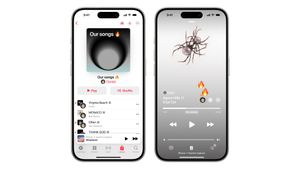JAKARTA - AI-capable wearable devices could spark debates about privacy, and anticipation of AR and VR proliferations is likely to set new privacy-related standards by 2024.
Meanwhile, at the same time, the significance of data breaches containing passwords is expected to decrease as two-factor authentication becomes more common, and users increase privacy through bot assistants.
According to Kaspersky, the emergence of the latest technology in social, economic and political fields by 2023, as well as this new technological trend, will be the main factor affecting the privacy landscape by 2024.
To that end, Kaspersky experts make predictions regarding the privacy landscape that will emerge as a result of this new technology, including:
Wearable devices equipped with AI can spark new debates about privacy
Although people already use devices such as smartphones and smart assistants in their homes, wearable devices, especially those with cameras such as smart glasses or AI pins, tend to raise more vigilance.
According to the cybersecurity company, the nature of this device can cause concerns for individuals who are aware of privacy, assuming the device gains popularity.
SEE ALSO:
AR and VR developments are ready to set new privacy standards by 2024
The launch of Apple products usually attracts public attention, triggering discussions about privacy, especially regarding technology that has not been regulated properly.
"With the introduction of the Apple Vision Pro and increasing integration of AR/VR into everyday life, privacy concerns will most likely be the center of attention," Kaspersky explained.
Increase privacy through the emergence of assistant bots
The increasing prevalence of bot assistants, which take advantage of natural language processing, offers attractive opportunities to increase user privacy in various sectors. State-of-the-art bot assistants can handle user calls smoothly, ensuring sensitive information, such as user voices are protected.
The leaked password will not cause concern
The main reason for the reduced concern about password leaks is the increasing prevalence of two-factor authentication where additional codes to confirm your login are sent via SMS or generated in a dedicated authentication application.
In addition, some services, such as Google, already have an authentication feature "without password" via password, while other services prefer biometric authentication over traditional codes.
The English, Chinese, Japanese, Arabic, and French versions are automatically generated by the AI. So there may still be inaccuracies in translating, please always see Indonesian as our main language. (system supported by DigitalSiber.id)


















